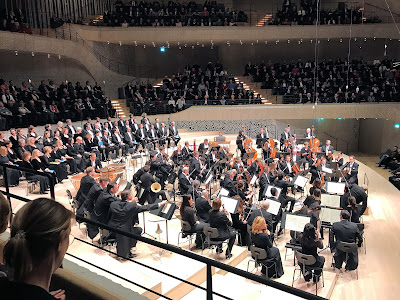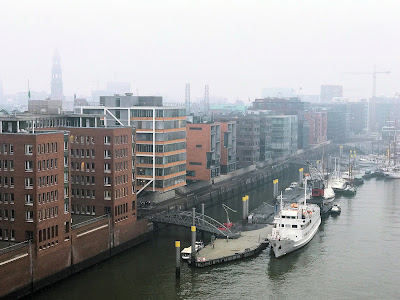Officially, Luther's Year began in Germany on October 31, 2016, to commemorate the 500th anniversary of the posting of the 95 Theses against the abuse of indulgences on the evening of the day before All Saints' Day in 1517. There is still the question.
If Martin Luther had a hammer, a hammer in the evening, did he use it to nail the paper with his theses to the door of the
Schlosskirche at Wittenberg? Well, Scotch tape had not yet been invented.
 |
| Brother Martin hammering, viewed the American way. |
The dramatic act of Brother Martin nailing is an embellishment of the 19th century, as theologians point out. They are no longer so sure, however, due to a Latin note by Luther's secretary, Georg
Roerer, discovered in 2006 in Luther's working copy of the New Testament from 1540. It reads "
Im Jahr 1517 am Vorabend vor Allerheiligen sind in Wittenberg an den Türen der Kirchen die Thesen über den Ablass von Doktor Martin Luther vorgestellt worden (In the year 1517 in the evening before All Saints' Day the theses against indulgence by Doctor Martin Luther were presented on the church doors at Wittenberg)."
Five hundred years of Reformation! Exceptionally, October 31, 2017, will be an official holiday in Germany. At his time, Luther was hailed as the liberator of the German people from the yoke of the Roman Church, so that in the spring of 1522, papal nuncio Cardinal
Hieronymus Aleander wrote in a letter to the Holy See:
Jetzt aber ist ganz Deutschland in hellem Aufruhr; neun Zehnteile erheben das Feldgeschrei: Luther! und das übrige Zehntel, falls ihm Luther gleichgültig ist, wenigstens: Tod dem römischen Hofe! (Now Germany is in total turmoil; nine-tenths of the people shout Luther! as their battle cry while the missing tenth, indifferent to Luther, demand at least: Death to the Roman court!).
Where there are winners, there are losers. Losers were those who died in the many religious wars following the schism. They culminated in the apocalypse of the Thirty Years' War, when one-third of the German population perished. Germany became a divided "nation" with a Protestant north and a Catholic south.
Protestants living in diaspora in Catholic regions and "Schwarze" (meaning Catholics) living their faith in territories dominated by "Blauköpp" (blue heads are Lutherans) had a hard time. Only the mixing of people following Germany's total defeat in the Second World War eventually mitigated those religious divisions. Today, we are mainly a non-religious country, with the former East German territories being a heathen land.
As many men before Luther initially demanded only reforms within the Catholic Church, he later advocated for a German Church independent of Rome. After all, the Reformation became a question of money. In particular, princes of German territories not under Catholic Habsburg rule attentively listened when Luther grumbled:
Wie kommen wir Deutschen dortzu, das wir solche reuberey, schinderey unserer güter von dem babst leyden mussen? hat das kunigreich zu Franckreich sichs erweret, warumb lassen wir Deutschen uns alszo narren und effen? (How come we Germans suffer such robbery and plundering of our goods by the pope? The French kingdom has resisted, so why do we Germans accept to be fooled and kidded?).
 |
| Luther, the movie. |
In 2003, a movie about Luther and the Reformation was released, starring Joseph Fiennes as Luther and the late polyglot and magnificent Sir Peter Ustinov as Luther's patron, Duke Frederick III, Elector of Saxony, also known as the Wise. Most of my American friends are unfamiliar with the movie when I mention it. As a poor
ersatz, I will point out two of Luther's main traits.
Above all, Luther was a family man. His wife, Käthe, gave birth to six children. They brought them up in the rigor of the Lord and in love, but Luther showed a violent temper when he felt that his religious convictions were under attack.
Peasants revolting against their masters, keeping them in serfdom, violated one of Luther's fundamental principles: Rulers are God-given and therefore must be obeyed under all circumstances. So he vociferated in an article
Wider die Mordischen vnd Reubischen Rotten der Pawren (Against the murderous and rapacious hordes of peasants):
Die Obrigkeit [soll] hier getrost fortdringen, und mit gutem Gewissen dreinschlagen, solange sie eine Ader regen kann. Die hie ist das Vortheil, daß die Bauern böse Gewissen und unrechte Sachen haben; und welcher Bauer darüber geschlagen wird, mit Leib und Seele verloren und ewig des Teufels ist … man soll sie zerschmeißen, würgen, stechen, heimlich und öffentlich, wer da kann, wie man einen tollen Hund erschlagen muss ... Bleibst du drüber todt, wohl dir, seligern Tod kannst du nimmermehr überkommen; denn du stirbst im Gehorsam göttlichen Worts und Befehls und im Dienste der Liebe deinen Nächsten zu retten aus der Hölle und des Teufels Banden (The authorities shall confidently proceed and strike with good conscience as long as they have blood in their veins. It is an asset that the peasants have a bad conscience and unjust items; a peasant who is beaten is lost with heart and soul and will belong to the devil eternally ... Those capable should break, choke, and stab them, secretly and publicly like slaying a mad dog ... You are blessed when you are killed in action. A more graceful death you will find nowhere; you will die in the obedience of God's Word and His order and in the service of love by saving your neighbor from hell and devilish bondage.
The Jews who were subdued by the Catholic Church were invited by Luther to embrace evangelical freedom. When they refused to convert an infuriated Martin wrote:
Wir müssen mit gebet und Gottes furcht eine scharfe barmhertzigkeit uben jre Synagoga oder Schule mit feur anstecke und was nicht verbrennen will, mit erden uber heuffe und beschütte, das kein Mensch ein stein oder schlacke davon sehe ewiglich, yre Heuser des gleichen zerbreche und zerstöre, damit man mag sie unter ein Dach oder Stal thun, wie die Zigeuner auff das sie wissen, sie seien nicht Herrn in unserm Lande, wo sie rhümen, sondern in Elend und gefangen. Außerdem solle man ihnen ihre heiligen Bücher wegnehmen, ihre Lehrer zum Schweigen bringen, ihnen verbieten, zu reisen oder Handel zu treiben, und ihren Besitz einziehen, denn alles was sie haben haben sie uns gestolen und geraubt durch jren Wucher (In praying and in the fear of God we must exercise a sharp charity in burning their synagogues, their schools, and cover up with dirt things that cannot be burned so nobody may see a stone or cinder for eternity. Break and destroy their houses, place them under a roof and in a stable like gypsies, so the Jews may learn that they are no masters in our country, where they exalt but are in misery and in captivity. Take away their books, silence their teachers, prohibit their travel, and ban them from commerce. Seize their goods and chattels for all the belongings they stole and robbed by ripping off.
Did Luther have a bad conscience when, in one of his sermons, he repeated:
Sine vi humana, sed verbo.
Ich bin dem ablas und allen papisten entgegen gewesen, aber mit keyner gewalt, jch hab allein Gottes wort getrieben, geprediget und geschrieben, sonst hab ich nichts gethan. Das hat, wenn ich geschlafen han, wenn ich wittenbergisch bier mit meynem Philipo und Amßdorff* getruncken hab, als(o) vil gethan, das das Bapstum also schwach geworden ist, das jm noch nye keyn Fürst noch Keyser so vil abgebrochen hat. Ich hab nichts gethan, das wort hatt es alles abgehandelt und außgericht. Wann ich hätt wöllen mit ungemach faren, ich wolt Teützsch lanndt in ein groß plut vergiessen gebracht haben, ja ich wolt woll zu Wurmbß (Worms) ein spil angericht haben, das der keyser nit sicher wer gewesen. Aber was were es? ein narren spil wer es gewesen. Ich hab nichts gemacht, ich hab das wort lassen hendeln (Without human violence only by the Word. I was against indulgence and against all papists, but without any violence. I solely propagated God's Word through preaching and writing; otherwise, I did nothing. God's Word did everything while I was sleeping or when I was drinking Wittenberg beer with my Philipo and my Amßdorff*. I have weakened papacy more than the emperor or the princes. I did nothing; the Word addressed everything and acted. If I had intended adversity, I would have caused great bloodshed. I could have made a play at Worms with the emperor feeling unsafe, but this would have meant just fooling about. I did not do anything I had the Word acting).
*Philip Melanchthon and Nicolaus von Amsdorf
Luther, was he a
Schreibtischtäter (someone who pulls the levers)? Two well-known German authors,
Heinrich Heine and
Thomas Mann, may illuminate Luther's traits: Heine, exiled in Paris, sought to present the German Luther to the French people, who had granted him asylum. He wrote in 1834:
Luther was not only the greatest but also the most German of men in our history. In his character, all virtues and faults of a German are amazingly combined, i.e., he, in his person, represents fabulous Germany ... He simultaneously was a dreaming mystic and a practical man of action. His thoughts not only had wings, but they also had hands; he spoke and acted. He was not only the tongue but the sword of his time. He was simultaneously a cold scholastic quibbler and an enthusiastic intoxicated prophet. When, during the day, he had slaved away at his dogmatic distinctions in the evening, he took his flute, looked at the stars, and melted in melody and prayer. The man who railed like a fishwife could be soft as a tender virgin ... He was full of a gruesome fear of God, full of devotion honoring the Holy Spirit; he was able to immerse himself in pure spirituality, yet he well knew the splendors of this world and appreciated those. From his mouth blossomed the famous slogan: Who does not love wine, women, and song, remains a fool his whole life long ... He was a complete man, I like to say an absolute man: spirit and matter were not separated ... and in his pamphlets, he gave in to plebeian brutality that is both repelling and magnificent.
Seamlessly, Thomas Mann wrote about Luther under the impression of the German defeat in 1945: Who would deny that Luther was an enormous great man, great in the most German style, as well as great and German in his ambiguity as a liberating and back-setting force, a conservative revolutionary. Nothing against Luther's greatness! Everybody is a priest. In doing so, he promoted European democracy. He was a hero of freedom, but in the German style. Actually, he knew nothing about freedom.
Are my German readers missing the texts above, in German? You shall find them on my website:
Freiburgs Geschichte in Zitaten (Freiburg's History by Citations). I recently updated the Luther web page, which contains some unusual details about the beginning of the Reformation.
**










































